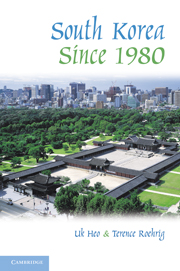Book contents
- Frontmatter
- Contents
- Dedication
- 1 Politics, Economics, and Foreign Relations before 1980
- 2 From Dictatorship to Democracy
- 3 Democratic Consolidation and Social Change
- 4 Economic Development and Financial Crisis
- 5 Economic Reform and the Korea–U.S. Free Trade Agreement
- 6 Inter-Korean Relations and the North Korean Nuclear Crisis
- 7 The South Korea–U.S. Alliance
- 8 South Korea and the Regional Powers
- Selected Bibliography
- Index
- References
3 - Democratic Consolidation and Social Change
Published online by Cambridge University Press: 05 June 2012
- Frontmatter
- Contents
- Dedication
- 1 Politics, Economics, and Foreign Relations before 1980
- 2 From Dictatorship to Democracy
- 3 Democratic Consolidation and Social Change
- 4 Economic Development and Financial Crisis
- 5 Economic Reform and the Korea–U.S. Free Trade Agreement
- 6 Inter-Korean Relations and the North Korean Nuclear Crisis
- 7 The South Korea–U.S. Alliance
- 8 South Korea and the Regional Powers
- Selected Bibliography
- Index
- References
Summary
On February 25, 1998, long-time dissident leader Kim Dae-jung was inaugurated as president. The election of President Kim had significant political implications in South Korean history. This lateral power transfer was the first in modern South Korean politics. Prior to the victory of Kim Dae-jung, candidates from the ruling party always won the presidential election. Thus, this power transition was the first time an opposition candidate won the election, an important indication that South Korea was becoming a stable democracy. Also, President Kim Dae-jung was different from his predecessors. He was the first president from Cholla Province, the southwestern part of South Korea, and he had a progressive, left-wing political orientation, by contrast with his predecessors, who were conservative, right-wing leaders from the southeastern Kyongsang Province. As a result, significant changes followed in his administration. In this chapter, we discuss political and social changes during the Kim Dae-jung administration in the context of the democratic consolidation process in South Korea.
Domestic Politics during the Kim Dae-jung Administration
Although South Korea experienced the transition to democracy in 1987, there were no clear political cleavages in South Korean society that led to distinct, institutionalized political parties. The chief explanations for this situation are grounded in the legacy of Confucianism and the Korean War. Confucianism emphasizes harmony and discourages division. The Korean War, the first conflict between the Korean people since Silla's unification of the country in 668 a.d., was a result of differences in political ideology.
- Type
- Chapter
- Information
- South Korea since 1980 , pp. 51 - 77Publisher: Cambridge University PressPrint publication year: 2010



